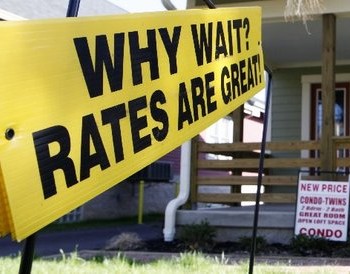 The housing market has been on a tear lately. In fact, according to last month’s S&P/Case-Shiller index, a closely watched gauge of national home prices, values increased by 10.9 percent in the last year. That is the most significant increase in seven years.
The housing market has been on a tear lately. In fact, according to last month’s S&P/Case-Shiller index, a closely watched gauge of national home prices, values increased by 10.9 percent in the last year. That is the most significant increase in seven years.
So what is driving the increase in values? Reductions in inventory, a slowly improving economy, renewed investor demand and ultra-low interest rates have all provided tailwinds for the improvement in the housing market.
In addition, the National Association of Realtors Affordability Index, which measures whether a typical family could qualify for a mortgage on a typical home based upon current prices and mortgage rates, has remained well above average levels. As interest rates have fallen over the years, affordability has improved since it costs less to finance a home. However, interest rates have been on the rise lately, sparking concerns that the housing recovery may be impacted.
Speculation that the Federal Reserve may end its bond buying program sooner rather than later have helped fuel the significant move in interest rates.
How much have rates jumped? According to the Freddie Mac Primary Mortgage Market Survey, in just five weeks, the rate on a 30-year mortgage increased from 3.35 percent at the beginning of May to 3.98 percent for the week ending June 13. During the same period, rates on a 15-year mortgage moved from 2.56 percent to 3.10 percent.
A 1 percent increase in interest rates may cause principal and interest payments on a $200,000, 30-year mortgage to increase by more than $1,370 per year. For many Americans, the increase is more than sufficient to affect affordability, which could present a problem.
In order for homeowners to maintain current affordability levels, median household income would have to increase sufficiently to keep up with interest rate increases. While the labor market is slowly improving, median household income is up only fractionally year-over-year and remains well below pre-recession levels. Improvements in the labor markets might be necessary to offset further increases in mortgage rates.
Also keep in mind that real estate prices are affected by gross domestic product growth and inflation.
Increases in either may help provide an additional boost, possibly leading to higher real estate prices which could help offset higher borrowing costs. However, many economists continue to forecast that our economy will grow just above stall speed in the coming months.
If household income does not increase along with borrowing costs and we fail to see strong economic growth, can the real estate market be expected to grow at its current rate?
Despite these concerns, housing prices in many markets are still quite attractive. While higher interest rates are certainly a drag on home values, affordability may be attractive enough to help offset some of the additional financing costs.
According to Hui Shan and Marty Young of Goldman Sachs & Co., “Even if mortgage rates continue to increase from here, the median home will still be affordable to the median borrower, based on the conventional 25 percent debt-to-income threshold. As a result, rising interest rates will likely slow the strong house price appreciation observed over the past year, but the impact will likely be modest given the cushion provided by the high level of housing affordability at present.”
Rising interest rates will undoubtedly impact the velocity of any housing recovery and it is unrealistic to assume the real estate market will grow by more than 10 percent per year as it did in the last 12 months.
However, interest rates still remain at historically low levels, housing affordability remains attractive and real estate generally holds up well during periods of rising inflation.
While there is no guarantee that rates will quickly move higher, those preparing to purchase a home or considering a refinance should carefully monitor interest rates.
Since everyone’s situation is unique, consider speaking to your financial adviser to determine the appropriate strategy for you.
Kurt J. Rossi, MBA, is a certified financial planner practitioner and wealth adviser.
He can be reached for questions at (732) 280-7550 and kurt.rossi@Independentwm.com. LPL Financial Member FINRA/SIPC









